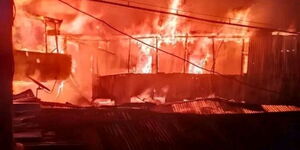In recent years, BBC Africa Eye, the investigations arm of the British broadcaster, has cemented itself as a force to reckon with when it comes to global content.
Speaking to Press Gazette, a UK publication, the programme's editor, Tom Watson, revealed that creating the package is not a walk in the park.
The show - BBC Africa Eye - is a popular show across the globe as it broadcasts in 37 countries. The show has so far amassed 73 million views on YouTube. In its 4-year run, it has bagged 27 awards.
Its success, however, is not born out of luck. During the show's introductory months, the team sought to do things differently including the process through which it collected its content.
For instance, one of their earliest endeavors was to visit locals and interact with the people to learn what issues they would like investigated.
“In the early days when we were doing our research, we would fly out and go to the slums of Nairobi or Kampala and buy a load of beers and get 20 or 30 guys together and say: What do you want to see investigated? What do you care about?
"From that first trip, we probably got our first half a dozen films," Watson told the publication.
To sustain the content flow, the programme partnered with hundreds of African journalists who help it in carrying out the investigations. They are spread across the continent stretching from Nairobi to Nigerian.
The new system has revolutionised the story-telling format adapted by BBC as opposed to its international partners who exercise a technique called 'Parachute journalism' which involves sending own personnel to far-flung countries on a contractual basis.
“There’s always a premium on having a person with skin in the game… When we set up Africa Eye, the easiest thing in the world would be to go to the local correspondents’ club and work with established names. But for us, it doesn’t matter if they’re a trained journalist or not," he added.
In Kenya, the exposé format has largely worked and succeeded in attracting the attention of the state and parastatals.
For instance, the programme lifted a lid on the flawed National Transport and Safety Authority (NTSA) process of issuing driving licenses. It exposed a syndicate that saw illegitimate drivers acquire licenses without training.
The weeks that followed saw a raft of changes in the authority including the training programmes as well as an intensified crackdown.
In August 2021, the show also lifted a lid, through an episode dubbed BBC Africa Eye Baby Stealers, on how children were being sold for as little as Ksh40,000 in Nairobi. The episode was later nominated for an Emmy Award.
The piece exposed the existence of a secretive but thriving illegal market for stolen babies in Kenya.
"It's not a brag to say we have changed the face of journalism on the continent of Africa forever," the programme's Senior Commissioning Editor, Vera Kwakofi, noted on its success.












